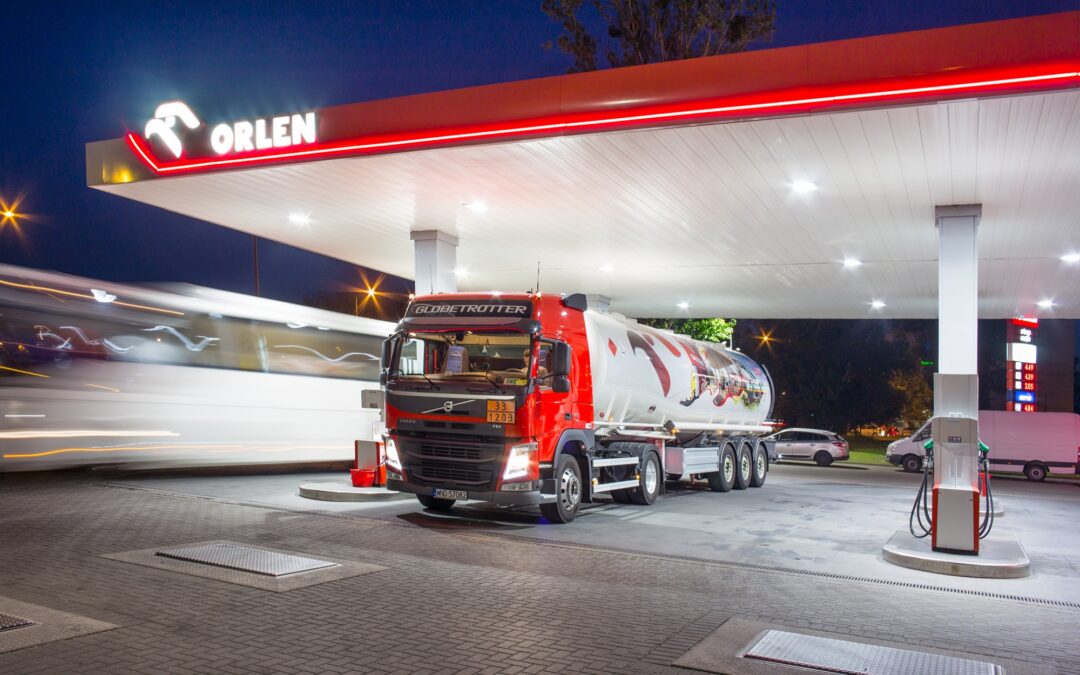The operator of public transport in the city of Wrocław is calling for Poland’s antitrust authority to investigate state oil giant Orlen, which it accuses of pushing up fuel prices. The firm’s boss says this cost his company almost 1 million zloty (€210,000) in December alone.
“This is the price we all pay for the monopoly of Orlen,” wrote Krzysztof Balawejder, head of MPK Wrocław, which operates the city’s buses and trams. “THIS IS NOT A FREE MARKET, THIS IS THE PARTY IN POWER STEALING FROM US…A THIEVING MONOPOLY.”
Balawejder is one of a number of voices accusing Orlen – which is the dominant player on Poland’s fuel market and whose CEO, Daniel Obajtek, has close ties to the ruling party – of price manipulation after petrol station prices remained the same despite an in VAT on fuel from 8% to 23% at the start of the year.
The firm, however, has denied such claims. “It is alleged that since we reduced the price on 30 December, we could have done it earlier,” its chief economic, Adam Czyżewski, told the Polish Press Agency (PAP). “We could not, because the market situation is such that it would have led to queues at the stations.”
Speaking yesterday, Prime Minister Morawiecki, also said that “Orlen did not inflate fuel prices” last year. He argued that actually it is “thanks to the fact that we have a large Polish energy concern that we can buy oil cheaper”, reports Business Insider Polska.
"Zarzuca się nam, że skoro obniżyliśmy cenę 30 grudnia, to mogliśmy to zrobić wcześniej. Nie mogliśmy, bo sytuacja na rynku jest taka, że doprowadzilibyśmy do kolejek na stacjach" — twierdzi główny ekonomista Orlenu Adam Czyżewski. W ten sposób odnosi… https://t.co/NPeaSqm5m5
— Business Insider Polska 🇵🇱 (@BIPolska) January 2, 2023
However, calls for an investigation of Orlen’s practices have also emerged among opposition politicians. The far-right Confederation (Konfederacja), like Balawejder, says it wants the antitrust authority, UOKiK, to look into the issue.
Tomasz Trzela, an MP from The Left (Lewica), claimed that “the raising of fuel margins by Obajtek and PiS in 2022 cost the average family up to 200 zloty a month”. He said that his party is submitting an application to the Supreme Audit Office (NIK), a state agency, to investigate.
“Enough robbing citizens by PiS,” he added.
Podbijanie marży na paliwa przez Obajtka i PiS w 2022 roku kosztowało przeciętną rodzinę nawet 200 zł miesięcznie. Przyłożyli rękę do cholernej drożyzny, żeby mieć pieniądze na kampanię wyborczą. Kierujemy w tej sprawie wniosek do NIK. Dość okradania obywateli przez PiS. pic.twitter.com/AK7BCC4bbe
— Tomasz Trela (@poselTTrela) January 2, 2023
Asked by Rzeczpospolita to comment on Orlen’s pricing practices, UOKiK said it could not do so without a detailed analysis. But it added that “we are looking at PKN Orlen’s actions on fuel prices and we do not rule out intervening in this matter”.
An earlier investigation carried out in 2022, however, did not reveal any abuse of a dominant position by Orlen or Lotos (a smaller state-owned oil firm taken over by Orlen last year), UOKiK told Rzeczpospolita.
In his remarks this week, Morawiecki argued that the price of petrol at Polish stations also depends on the national currency’s exchange rate because oil is bought in dollars.
Experts have been talking about the unusual situation in the fuel market for some time.
“Retail margins earned on liquid fuels in Poland have been relatively high for the past few weeks,” said Jakub Bogucki, an analyst quoted by the Rzeczpospolita daily. “This was widely believed to be so that stations could lower them from the new year onwards, thus preventing price spikes due to large tax increases.”
According to mBank analysts, fuel price overvaluation may have added 0.6 percentage points to inflation in November.
“The change in VAT from 8% to 23% did not actually translate into fuel prices. This was thanks to the sudden drop in wholesale prices at the end of the year. What if wholesale prices had behaved ‘typically’? We would have had ~16.9% inflation in November (rather than 17.5%) and perhaps ~16% in December.”
🇵🇱 Zmiana VAT z 8% do 23% w zasadzie nie przełożyła się na ceny paliw. Było to możliwe dzięki nagłemu spadkowi cen hurtowych w końcu roku. Co byłoby gdyby ceny hurtowe zachowały się "typowo"? Mielibyśmy ~16,9% inflację w listopadzie (a nie 17,5%) i być może ~16% w grudniu.
— mBank Research (@mbank_research) January 2, 2023
Main image credit: Orlen press materials

Alicja Ptak is deputy editor-in-chief of Notes from Poland and a multimedia journalist. She has written for Clean Energy Wire and The Times, and she hosts her own podcast, The Warsaw Wire, on Poland’s economy and energy sector. She previously worked for Reuters.




















